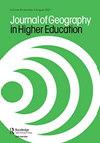学生使用虚拟现实调查自然灾害现场的评估
IF 1
4区 教育学
Q2 EDUCATION & EDUCATIONAL RESEARCH
引用次数: 5
摘要
当传统的实地考察面临压力时,无论是预算缩减、碳足迹减少、对人身安全的担忧增加,还是希望让所有人都能获得实地考察技能,我们如何确保观察、数据收集和景观分析的关键技能仍然可以在我们的学生中得到发展?本文通过Q方法评估了学生使用沉浸式虚拟现实(VR)来询问高度精确的地理参考景观模型的体验,这些模型由无人机收集的数据制成。研究发现,先前的参与与It和游戏技术的专业知识之间似乎存在关联,因此那些宣称具有一定程度实力的人会参与并拥抱使用VR的机会。这表明,为了让更多的学生采用这种积极的学习方法,教育工作者需要少担心复杂和现实的模型,而更多地投入到积极的先前使用技术的经验中。此外,在关于“在野外”的物理本质以及与同伴和导师的社会互动的叙述中,一个重要的声音质疑了一种仍然是相对孤独体验的方法。本文章由计算机程序翻译,如有差异,请以英文原文为准。
Student evaluations of using virtual reality to investigate natural hazard field sites
ABSTRACT At a time when traditional fieldwork is coming under pressure, be it from shrinking budgets, reducing carbon footprints, increased concerns for personal safety or the desire to make field skills accessible to all, how do we ensure that the key skills of observation, data collection and landscape analysis can still be developed in our students? This paper evaluates the experiences of students using immersive virtual reality (VR) to interrogate highly accurate georeferenced landscape models, made from data collected by Unmanned Aerial Vehicles, through the medium of Q methodology. It finds that there appears to be an association between prior engagement and expertise with IT and gaming technologies, such that those who declare some degree of prowess engage with and embrace the opportunities of using VR. This suggests that to allow more students to adopt positive approaches to learning in this manner, educators need to worry less about ever complex and realistic models, and invest more into positive prior experiences of using technology. Moreover, an important voice in the narrative around the physical nature of “being in the field” and social interaction with peers and tutors questions an approach that is still a relatively solitary experience.
求助全文
通过发布文献求助,成功后即可免费获取论文全文。
去求助
来源期刊

Journal of Geography in Higher Education
Multiple-
CiteScore
5.80
自引率
9.50%
发文量
29
期刊介绍:
The Journal of Geography in Higher Education ( JGHE) was founded upon the conviction that the development of learning and teaching was vitally important to higher education. It is committed to promote, enhance and share geography learning and teaching in all institutions of higher education throughout the world, and provides a forum for geographers and others, regardless of their specialisms, to discuss common educational interests, to present the results of educational research, and to advocate new ideas.
 求助内容:
求助内容: 应助结果提醒方式:
应助结果提醒方式:


